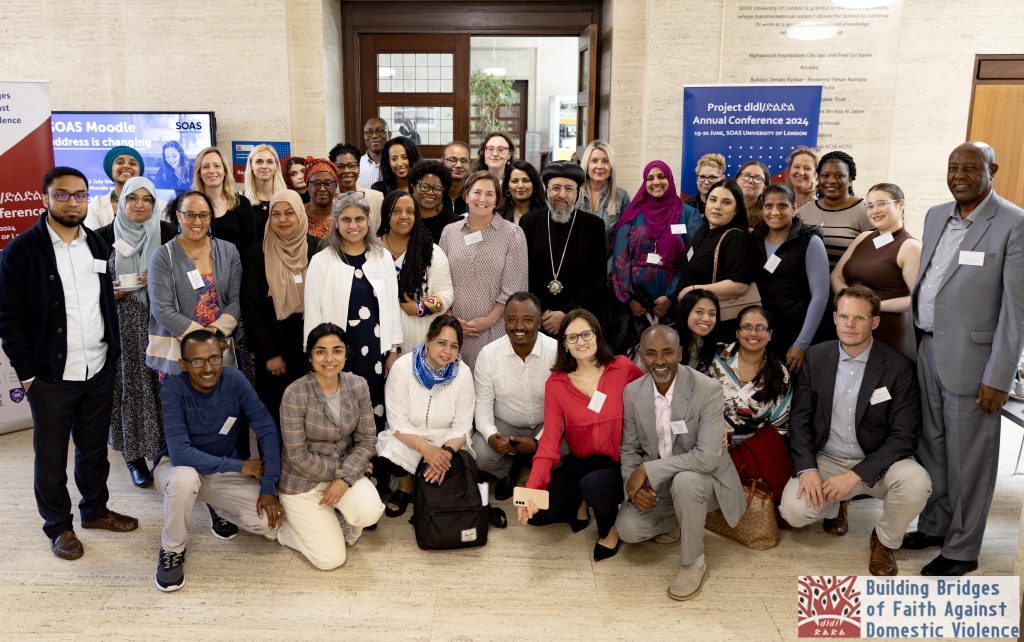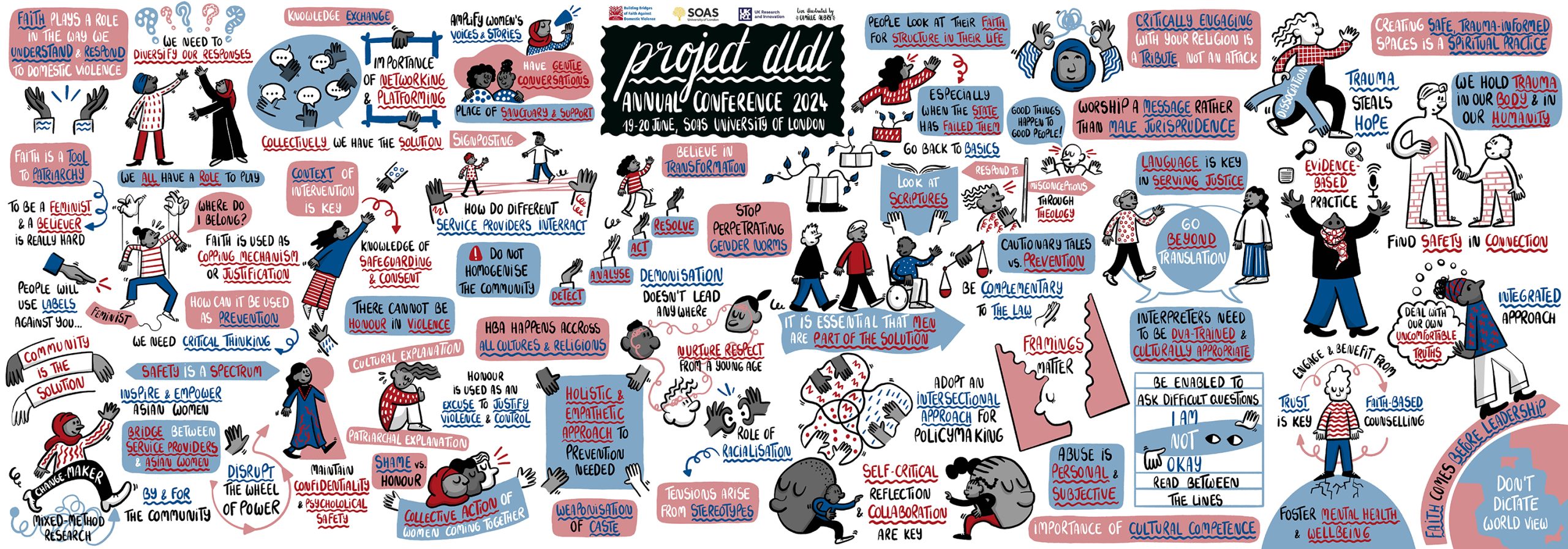This language is currently in review and will be available soon!

On 19-20 June 2024, Project dldl/ድልድል held its Annual Conference 2024 on the topic ‘Domestic Violence, Religion and Migration: Integrating cultural and religious diversity in UK domestic violence and abuse services and developing a future roadmap for the sector.’
The aim of the conference was to build bridges between domestic violence and abuse (DVA) researchers, secular DVA providers, religious institutions and ‘by and for’ organisations catering to specific religio-cultural communities to move the conversation around faith-sensitive and culturally appropriate responses in the UK forward and to delineate a concrete roadmap of priority areas to be addressed collectively by the sector. It also sought to enlarge knowledge and good practices in the UK by channelling into the conversations knowledge and experience from numerous African countries, including Ethiopia and South Africa.
The conference was attended by about 80 participants from at least 15 different organisations, the majority working in DVA services provision in the UK, and catering to diverse faith communities. In addition, the event was attended by Nicole Jacobs, the Domestic Abuse Commissioner of England and Wales, and Archbishop Angaelos of the Coptic Orthodox Church in the London.
Organisations and initiatives represented at the conference included the Faith and VAWG Coalition, Respect, Restored, Safe in Faith, Imams Against Domestic Violence, AMINA, FORWARD, Black Churches Domestic Abuse Forum, Sikh Women’s Aid, Coaction Hub (a partnership between Standing Together & Asian Women’s Resource Centre), the Dahlia Project (delivered by Peterborough Women’s Aid and evaluated by Dr Mirna Guha at Anglia Ruskin University), EMIRTA Research, Training and Development Institute in Ethiopia, Fnot Psychosocial Counselling Charitable Organization in Ethiopia, and others. Numerous universities from the UK, Ethiopia and South Africa were also represented in the room, including SOAS University of London, University of Bristol, University of Sheffield, Anglia Ruskin University, Sheffield Hallam University, University of Kent, Queen Mary University of London, Addis Ababa University, Stellenbosch University and others.
The conference sessions and the roundtable discussion were captured through a live illustration (shown below). The illustration evidences the richness and depth of issues explored on the day, and the interconnections between the issue of cultural and religious competence in DVA services with issues of epistemological colonisation, racialisation, theological interpretation, trauma and mental health and wellbeing.

The discussions have been summarised by Dr Romina Istratii and the Project dldl/ድልድል team in a conference brief, which was circulated and reviewed by many of the conference speakers and contributors. The brief has also been shared with the Domestic Abuse Commissioner in England and Wales.
The conference presentation slides can be accessed and viewed through the link below.
The recordings of all the session and talks delivered on the day can be accessed on the project dldl/ድልድል Vimeo account.
Highlights and testimonials are showcased below.
A photo gallery has been created with all the highlights of the day. The photos are watermarked and can be used by speakers and participants to share conference outcomes on social media and organisational media posts.
A post-conference survey was circulated to capture the representation in the room and some of the preliminary outcomes of the event. The sections below highlight some of the feedback received, but the full post-survey results can be downloaded also as a PDF below.
In total, 34 responses were received, which comprises approximately 42.5% of all conference participants. Hence, while the results are not representative of all participants, they expresse the views of close to half of them. Among these, 79% percent attended on both days, about 18% only the first day and about 3% only the second day. The post-conference survey evidenced a representation of diverse backgrounds and ethnicities at the conference, the majority being of Asian (about 27%), Black (about 33%) and White (40%) ethnicity. About 31% were from research institutions/universities, about 16% from feminist and women’s organisations, about 16% from domestic violence charity services serving all groups, 12.5% from ‘by and for’ DVA services, 12.5% from government and 12.5% from religious institutions.
The testimonials evidenced the overall positive effects of the conference, stressing the importance of holding intersectoral and cross-disciplinary events to address topical questions around DVA in society and to mobilise effective collective action. They spoke about the sharing of learning, knowledge and experience achieved at the conference and the networking and partnerships-building, especially with faith actors and religious stakeholders, and the exposure to new ways of engaging faith and religious organisations in DVA services provision.
“There was a lot of shared learning and getting to know about faith and how important it is within VAWG sector and linking with faith actors and partners and how much its needed, the work to be done and so many challenges.”
Survey respondent
“The research evidence and shared practice have been very helpful and will validate and strengthen our existing work on engaging with religious leaders as well, in addition to exploring new partnerships.”
Survey respondent
“I have set myself actions to achieve in the next 12 months. I hope to update you on at next year’s conference :-). One is to contact the faith organisation group we have contact with and be part of their meetings to look at how to implement my learning from the conference into how they look at safeguarding and domestic abuse.”
Survey respondent
Testimonials were also received through email (consent obtained to share) and shared through participants’ public profiles and social media. These again noted the diversity represented in the room, crossing disciplines, sectors, secular and religious boundaries, and the ability of the conference team to foster genuine learning and to overcome siloed action. Some found the conference an illustrative example of decolonising practice and a safe and productive space to better understand and navigate DVA trauma.
“Thank you to you and your team for organising such a successful conference. It has really brought to life for me what decolonising practice means.”
Joanna Szuryn, Respect, email correspondence
“There was so much to reflect, learn and many important points to be taking over within our organisation to collaborate and build bridges. Sadly VAWG is a persistent pandemic within pandemic and we cannot do it on our own, we need healthcare professionals, policy makers, funders and activists, feminists and most importantly men from all sectors particularly within faith institutions to be aware and sensitised around these issues and to stand and do more against the harm caused towards women due to male violence. There are women who are harmed at faith institutions and this issue cannot be ignored, Project dldl conference showcased good practices and the alarming gaps within UK to safeguard women.”
Aasifa Usmani, Coaction Hub Coordinator, AWRC Training Manager, email correspondence
“The conference was a success in that there were an array of disciplines in the room and the space, conversations and discussions were lively, honest and powerful.”
Sukhvinder Kaur, Chair / Faith & Exploitation Lead at Sikh Women’s Aid, LinkedIn
“Honored to have attended the 2024 annual conference of Project dldl/ድልድል at SOAS University of London. Over two impactful days, we focused on building bridges of faith against domestic violence, exploring the intersections of Religion and Migration. Grateful for the insightful discussions and the opportunity to collaborate with dedicated professionals committed to making a difference. Kudos to the organizers for a successful event!”
Rev. Yigzaw Mekonnen, Executive Director of Fnot Social and Psychological Charitable Organisation in Ethiopia, LinkedIn
“The conference contribution raised issues, evidence, and practices on faith communities’ involvement with the work needed within VAWG and learning from other countries that can provide good practice guidance. The conference brought international academics, scholars, researchers, policymakers, service providers and practitioners to a common cause. An exciting approach of having theologists’ perspectives is essential in moving forward with the work with faith communities in tackling domestic violence. This was an event of networking globally as participants came from England, Scotland, Ethiopia, and South Africa and were in attendance with the Domestic Violence Commissioner for England and Wales, Nicole Jacobs. A fantastic event.”
Aysha Ahmed, Founder and Director at Aasha Consulting, LinkedIn
“Can I just say I that I found the conference healing, I grew up with domestic violence and it felt like debrief of that experience. Thank you!”
Anonymised, email correspondence